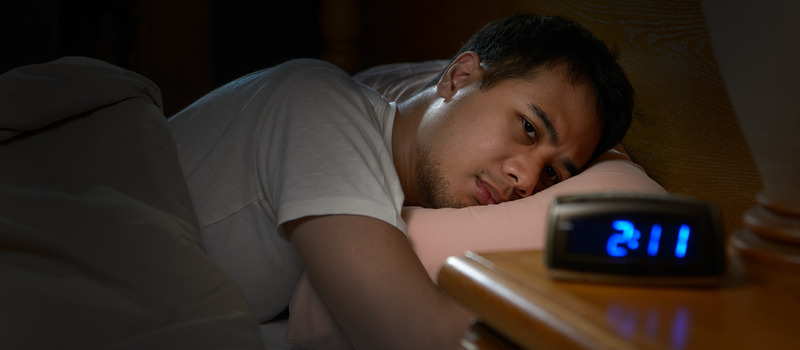Sleeplessness: Causes, signs and symptoms — how to improve sleep
Published November 6, 2022

Nearly all of us have spent at least one night wide awake and willing for sleep to come. Whether it is difficulty falling asleep, staying asleep or waking early, more than 30% of us experience times of sleeplessness.
Sleeplessness does not depend on the number of hours an individual may sleep. It is more about your perception of how much you sleep or how well you sleep and how this affects your daytime functioning. The concept of a good night’s sleep varies widely from person to person, so what may seem like poor sleep for you, might be considered a good sleep for someone else.
Sleeplessness symptoms include sleepiness during the day and a lack of energy, as well as making you feel irritable or anxious. Poor sleep may also impact on problems at work or school as it causes difficulty in paying attention, learning and remembering.
Most of us need to sleep continuously for between six and eight hours to stay physically, emotionally and mentally healthy. It gives your body time to recuperate, repair and allows your brain to process the day’s events. Adequate sleep affects your ability to think clearly, make decisions and react to situations. It’s also vital for everyday learning and good memory.
What can cause poor sleep?
You may have acute periods of poor sleep which can last for a single night to a couple of weeks or more chronic (long term) periods of poor sleep.
Other causes of poor sleep can include:
Substances — including alcohol, nicotine, caffeine, and some prescription medicines.
Stress — Stressful life events like moving to a new house, financial pressures, work, new parenthood, relationship issues or loss of a loved one.
Habitual, poor sleeping habits — Poor sleep hygiene is the most common cause of poor sleep. Try to adopt a regular sleep routine and bedtime ritual for a good night’s sleep.
Medical conditions — chronic pain, arthritis, rhinitis.
Mental health conditions — such as anxiety.
Other causes can include lack of physical activity, over-stimulation late at night, shift work, travelling to new time zones or jetlag and acute medical illnesses such as a cold or flu.
What are the signs of poor sleep?
The most obvious poor sleep symptom is of course a long and restless night, but it’s the daytime symptoms that can really take their toll. These can include:
- Tiredness, grumpiness and irritability
- Forgetfulness and poor concentration which may even increase your risk of injury
- Trouble waking up at a normal time
- Concern about lack of sleep
- Anxiety which can also cause poor sleep
- Tension headaches and digestive symptoms
How to get a good night’s sleep
Sleep is a very complex process. It’s a series of 90-minute cycles that have four different stages of sleep depth. When you first fall asleep, you enter a light sleep (stage one). At this point, you can be easily woken and won’t feel like you have been asleep. As your sleep continues, you’ll progressively descend into a deeper sleep (stages two, three and four). It will take about 40 minutes after falling asleep to descend to stage four, the deepest part of your sleep cycle. It’s very difficult to be woken from this stage and if you are, you will feel confused and groggy. Following this deep sleep, you will re-enter stage three, then two, then back to stage one.
For most people wanting to get back into a regular sleep cycle, sleeplessness cures can be simple lifestyle changes. Check out our Top 10 tips for better sleep.
If you find yourself falling asleep with no issues, but wake up through the night try the following:
Tips to fall back asleep after waking up
- Relaxation techniques — If you’re struggling with sleep through the night, try practising deep breathing or visualization. Progressive muscle relaxation is another technique that may be useful. This involves tensing your muscles one by one as tightly as you can and then completely relaxing them. Start at your feet and work your way up to the top of your head.
- Use the 20-minute rule — If, after about 15‐20 minutes of trying, you’re still not able to get back to sleep, leave the bedroom. Tossing and turning will only make sleep even more elusive. Do something relaxing in another room such as reading a book under low light or some easy stretches until you feel sleepy. Importantly, avoid screens of any kind such as laptops, mobile phones and the TV as these have stimulating effects on the mind and can trick your body into thinking it should be awake.
- Put the clocks/phones out of sight — If you wake long before the sun comes up, chances are the first thing you do is check the time. Unfortunately, knowing how long you’ve been awake only perpetuates sleeping difficulties. Keep the alarm clock/phone in your bedside drawer or under your bed, and resist the temptation to look at it through the night.
- Keep light to a minimum — If you wake up in the early hours because you need to use the bathroom, keep light to a minimum, which will make it easier to fall back asleep. Bright light can cue your body clock that it’s time to wake up.
- Try a herbal remedy — A soothing chamomile tea or sleeping remedy with ingredients such as lactium, hops, as well as ziziphus which is used in traditional Chinese medicine to calm the nerves, and relieve restless sleep.
How Nature’s Own Can Help
Nature’s Own have several sleeping remedies available to help you get your important sleep. Learn about which Nature’s Own product may be appropriate for you.
If your sleeping difficulties have persisted over a number of years, you may need to seek professional support, which could involve visiting a sleep disorder clinic where treatment may include keeping a sleep diary, a specialised sleeping program, medication and/or behavioural therapy.
MAT-AU-2102350
Learn about which Nature's Own product may be appropriate for you.
SEE THE PRODUCTS HERE







